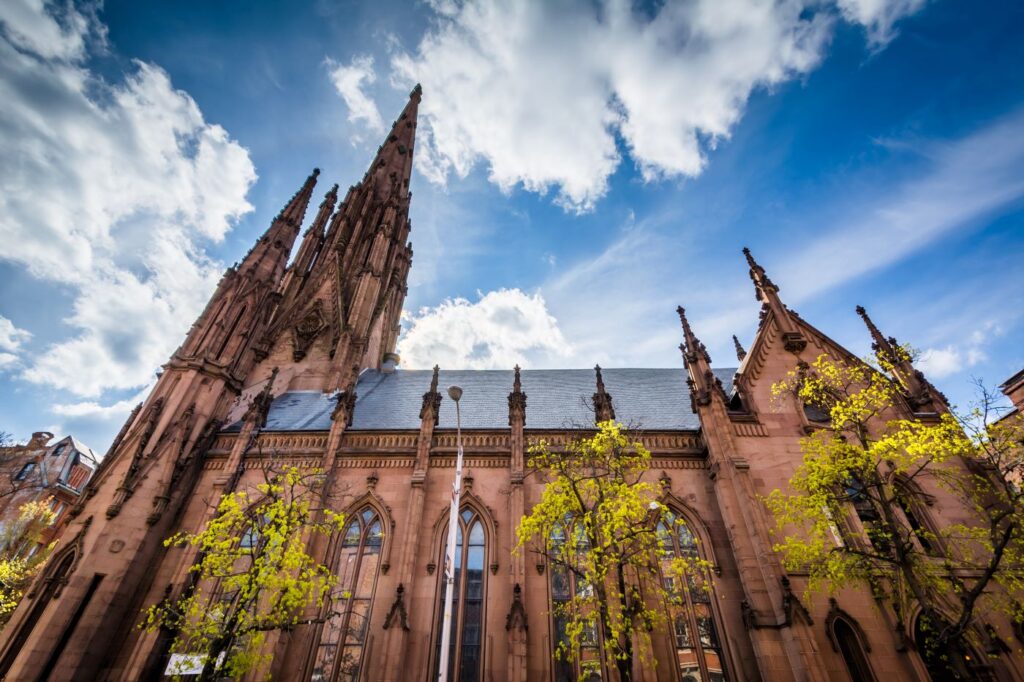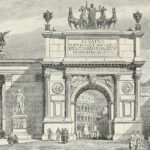In 1923, a short book entitled Christianity and Liberalism, written by the Presbyterian J. Gresham Machen, hit the market. At the time, Machen was a professor of New Testament Studies at the Princeton Theological Seminary. He wrote the book in response to the liberal theology that he saw spreading in many church bodies and seminaries, including his own.
When Machen wrote, America was rapidly undergoing urbanization, industrialization, and immigration, while rising global conflicts and economic booms and busts loomed on the horizon. The world was changing, modernizing. Young people were moving away from farms to burgeoning cities. Women were challenging social conventions. Men were finding themselves more distant from their own families and more beholden to the workplace. Scientific, medical, and technological advancements were increasing life expectancy and reducing infant mortality. Nature, red in tooth and claw, was getting a manicure.
Where was this new world headed? And what role would Christianity play in such a world where humanity seemed to be getting better and better, and death no longer seemed imminently threatening? It was the age of progress, after all. Did Christianity need to adapt to the times and get a manicure, too? Or would the sharp edges of sin and grace, death and life, crucifixion and resurrection still form the structure and core of the Christian message?
It was in this context that Machen contended that Christianity still hangs on Jesus Christ, the God-Man who reconciles mankind to the Father. If Christianity focused on earth-bound goals like alleviating poverty or initiating social improvement while overlooking core Christian doctrine as summarized in the Creed, it served no real purpose. If Jesus was just window-dressing for political or cultural change, why remain faithful to him? Hence, Machen argued, modernist approaches to Christianity were a completely different religion. For Machen, what makes Christianity relevant in changing times is that it doesn’t change.
Start your day with Public Discourse
Sign up and get our daily essays sent straight to your inbox.The century-old thesis advanced in Christianity and Liberalism still has purchase for Catholics, Orthodox, and Protestants, since the temptations of the liberal Christianity of Machen’s day continually resurface under various guises.
Two Competing Religions
Perhaps Machen’s most prescient and provocative claim is that “the great redemptive religion which has always been known as Christianity is battling against a totally diverse type of religious belief, which is only the more destructive of the Christian faith because it makes use of traditional Christian terminology.” This was a “modern non-redemptive religion” that Machen called “modernism” or “liberalism.” By liberalism, Machen does not mean liberalism in the sense of a protection of individual rights and personal liberties. Nor does he mean liberalism in the sense of a left-wing political agenda. Instead, he uses the term theologically to refer to “modern liberal religion” that is “rooted in naturalism.” The defining characteristic of theological liberalism is “the denial of any entrance of the creative power of God . . . in connection with the origin of Christianity.”
Attempts to make Christianity more palatable to modern scientific people by vacating the supernatural from the Bible, by dividing Jesus into the Christ of faith and the Christ of history, or by focusing only on Jesus’ moral teachings ultimately undercut the whole enterprise. Machen further argues that you cannot divorce Christianity from science and history without gutting its core truth claims, leaving you with something that is distinctly not Christianity. Machen saw the whole attempt to separate Christian morality from doctrinal content and historical events—to try to modernize Christianity by focusing on Jesus’ moral teachings, not redemption, or on social progress, not doctrine—as flawed from the beginning.
In the book, he poses the question: “Is it really doctrine as such that is objected to, and not rather one particular doctrine in the interests of another?” His answer is clear: “there are doctrines of modern liberalism, just as tenaciously and intolerantly upheld as any doctrines that find a place in the historic creeds.” In other words, liberalism certainly has doctrines of its own; just ones that are more palatable to the modern age. He then goes on to compare the core doctrines of modern liberal religion to historic Christian orthodoxy.
The Princeton theologian drills down farther into the modernist separation of Christ’s moral teachings from his divine claims and supernatural acts. Machen’s argumentation could be seen as a precursor to C. S. Lewis’s famous Liar, Lunatic, or Lord framework. In this construct, Lewis argues that if you make Jesus out to be solely a good moral teacher, he would actually end up being a liar or lunatic since he made Divine claims about himself and good teachers don’t lie about themselves. This leaves one viable option: Jesus is Lord. Machen similarly notes that Jesus “plainly presented Himself, not merely as an example for faith, but as the object of faith.” Furthermore, if Jesus were a moral teacher par excellence, how could he have “lapsed so far from the path of humility and sanity as to believe that the eternal destinies of the world were committed into His hands?” Machen goes on to say: “The truth is that if Jesus be merely example, He is not a worthy example; for he claimed to be far more.” The attempts to reconstruct a historical Jesus or strip his life of any supernaturalism might seem to make him more acceptable to modern people. But “the liberal Jesus, despite all the efforts of modern psychological reconstruction to galvanize him into life, remains a manufactured figure of the stage.”
Machen distinguishes the Jesus of the New Testament, saying: “The Jesus of the New Testament has at least one advantage over the Jesus of modern reconstruction—He is real. He is not a manufactured figure suitable as a point of support for ethical maxims, but a genuine Person whom a man can love.” The real Jesus proclaimed a real event in real time and real space, not just moral principles or spiritual ideas. And even more, he was the event. He goes on to say: “Jesus was certainly not a mere enunciator of permanent truths, like the modern liberal preacher; on the contrary he was conscious of standing at the turning-point of the ages, when what had never been was now to come to be.”
Juxtaposing theological liberalism’s understanding of God and man with historic orthodoxy also reveals deeper fault lines. “In modern liberalism,” Machen states, “the name ‘God’ is applied to the mighty world process itself,” making God “not a person distinct from ourselves.” Certainly, the God of the Bible is both immanent and transcendent, “but he is immanent in the world not because he is identified with the world, but because He is the Creator and Upholder of it.” Once any meaningful Creator–creature distinction is lost, a true doctrine of man is lost, too, until all that is left “is a supreme confidence in human goodness,” which leaves us with a system with no need for God anyway. Modern liberalism, Machen concludes, “has lost sight of the two great presuppositions of the Christian message—the living God, and the fact of sin.”
Machen also considered the doctrine of the Church. In the early twentieth century, modernist Christians viewed the church as a vehicle for social change. This was the era of the social gospel and preachers like Harry Emerson Fosdick and Walter Rauschenbusch. Theirs was a message not of Christ as the redeemer of mankind and restorer of creation, but of human progress and moral improvement. Machen was concerned about the utopian undertones of this growing focus on improving society and bringing about a better world. For Machen, the church should not primarily be driven by a desire for cultural change, though its work would inevitably generate change. Rather, the church was an eschatological community gathered around Christ and his gifts of forgiveness and salvation, which creates and sustains a richer and deeper form of culture that overflows into daily life, education, and society. He warned that this expression was being lost and contaminated because Christianity and liberalism were mixing within the same church bodies and Christian institutions, leading those organizations toward decay. In Machen’s view, one of the greatest threats “to the Christian church today comes not from the enemies outside, but from the enemies within; it comes from the presence with the Church of a type of faith and practice that is anti-Christian to the core.”
In Machen’s view, one of the greatest threats “to the Christian church today comes not from the enemies outside, but from the enemies within; it comes from the presence with the Church of a type of faith and practice that is anti-Christian to the core.”
Contemporary Applications
The thesis of Christianity and Liberalism still has surprising relevance. When Christian churches and institutions, preachers and teachers offer new interpretations on doctrinal, ethical, or sexual matters today, we should remember Machen’s advice. Namely, such innovations are not small modifications of Christianity; rather, they create a completely different religion with its own foundational assumptions and commitments. One cannot jettison clear Christian moral teachings or doctrines as defined by the creeds, confessions, and catechisms of the historic church and still rightly claim the Christian label. In Machen’s day, the challenge was primarily theological, as modernists questioned doctrines like the virgin birth, the deity of Christ, and biblical authority. Today, however, the challenges frequently come in the realm of anthropology, ethics, and sexuality, which one could argue are even more foundational to what it means to be human and to live in community.
It’s worth considering Machen’s suggestions regarding what individuals and churches should do when larger institutions and church bodies fail. Christians committed to historic orthodoxy must stand and fight to maintain the faith once delivered to the saints. But if their attempts are unsuccessful in their specific institutions, they must, as Machen says, “be prepared to withdraw no matter what it costs.”
By “withdraw,” Machen didn’t mean heading for the hills. He meant separating from the corrupted institutions to form new ones, and this he certainly did. The Princeton Seminary professor took substantial personal risks when he resigned in 1929 to start Westminster Theological Seminary in Philadelphia, which still stands today. He also played a key role in the formation of the Orthodox Presbyterian Church; this began in 1936 in response to the widespread infiltration of theological liberalism and rejection of creedal Christian doctrines in the Presbyterian Church in the U.S. Machen considered such bold moves necessary for maintaining fidelity in the face of unbiblical teaching and ideas.
Committed Protestant that he was, Machen also noted that despite disagreements, there was a “great common heritage which unites the Roman Catholic Church, with its maintenance of the authority of Holy Scripture and with its acceptance of the great early creeds, to devout Protestants today.” While to Machen the Catholic–Protestant gulf was still profound, it seemed “almost trifling compared to the abyss which stands between us and many ministers of our own Church.” This makes for some interesting alliances in our day, too. Frequently there are progressive and orthodox wings within church bodies, which means we might be more closely aligned on foundational issues with those from orthodox wings of other church bodies than with the progressives in our own.
What the next century portends is an open question, but despite the daunting challenges, Machen’s concluding words 100 years ago are apt in closing:
Is there no refuge from strife? Is there no place of refreshing where a man can prepare for the battle of life? Is there no place where two or three can gather in Jesus’ name, to forget for the moment all those things that divide nation from nation and race from race, to forget human pride, to forget the passions of war, to forget the puzzling problems of industrial strife, and to unite in overflowing gratitude at the foot of the Cross? If there be such a place, then that is the house of God and that the gate of heaven. And from under the threshold of that house will go forth a river that will revive the weary world.
In a time when the political, religious, and cultural challenges strikingly parallel those of Machen’s day, his arguments and actions offer us a set of timeless and timely insights. We would all do well to observe them.
Image by jonbilous and licensed via Adobe Stock. Image resized.














